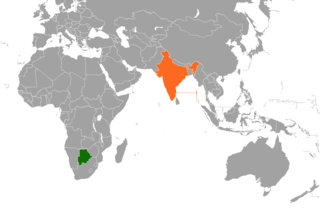Related Research Articles

RITES Ltd, formerly known as Rail India Technical and Economic Service Limited, is a Navaratna central public sector undertaking under India's Ministry of Railways. It was incorporated on April 26, 1974, and is a multidisciplinary engineering and consultancy organization providing a comprehensive range of services from concept to commissioning in all facets of transport infrastructure and related technologies.

Indian Indonesians are Indonesians whose ancestors originally came from the Indians subcontinent. Therefore, this term can be regarded as a blanket term for not only Indonesian Indians but also Indonesians with other South Asian ancestries. According to the Indian Ministry of External Affairs, there were about 120,000 people of Indian origin as well as 9,000 Indian nationals living and working in Indonesia as of January 2012. Most of them were concentrated in the province of North Sumatra and urban areas such as Banda Aceh, Surabaya, Medan, and Jakarta. However, it is quite impossible to get correct statistical figures on the Indian Indonesian population, because some of them have merged and assimilated with the indigenous population to become indistinguishable from native Indonesians.

Hinduism is a minority religion practised by 0.3% of the population of Botswana. The practice of Hinduism in Botswana is concentrated in and around Gaborone and Selebi-Phikwe. The community of Hindus began to form in the early 20th century with the beginning of immigration from India to Botswana. Most Hindus in Botswana are of Indian descent.
Indians in Spain form one of the smaller populations of the Indian diaspora. According to the statistics of India's Ministry of External Affairs, they number only 35,000, or 0.07% of the population of Spain. 2009 statistics of Spain's Instituto Nacional de Estadística showed 35,686 Indian citizens in Spain; this figure does not include persons of Indian origin holding other citizenships. Most Indians originally migrated to Spain from Africa, while others came from India and even Japan and Southeast Asia. The overwhelming majority of Indians in Spain live in the Barcelona area. According to data from 2021, Indians in Spain number more than 57,000.

Christianity is the largest religion in Botswana. However, the country is officially secular and allows freedom of religious practice.
There is a small but recognisable community of Indians in Zambia. Unlike the better-known Indian communities of South East Africa, they were little-studied by historians until the 2000s.

Overseas Indians, officially Non-Resident Indians (NRIs) and People of Indian Origin (PIOs) are Indians who reside or originate outside of India. According to the Government of India, Non-Resident Indians are citizens of India who currently are not living in India, while the term People of Indian Origin refers to people of Indian birth or ancestry who are citizens of countries other than India. Overseas Citizenship of India (OCI) is given to People of Indian Origin and to persons who are not People of Indian Origin but married to Indian citizen or People of Indian Origin. Persons with OCI status are known as Overseas Citizens of India (OCIs). The OCI status is a permanent visa for visiting India with a foreign passport.

Overseas Citizenship of India (OCI) is a form of permanent residency available to people of Indian origin and their spouses which allows them to live and work in India indefinitely. It allows the cardholders a lifetime entry to the country along with benefits such as being able to own land and make other investments in the country.

Indian Mexicans are Mexican citizens who are descendants of migrants from India.
Indians in Peru form a tiny minority in the country and are one of the smaller populations of the Indian diaspora. According to the Indian Ministry of External Affairs, there were about 500 Indians living in Peru as of December 2016.

India–Uganda relations are bilateral relations between the Republic of India and the Republic of Uganda. India and Uganda established diplomatic relations in 1965 and each maintain a High Commission in the other's capital. The Indian High Commission in Kampala has concurrent accreditation to Burundi. Uganda hosts a large Indian community and India–Uganda relations cover a broad range of sectors including political, economic, commercial, cultural and scientific cooperation.

The Sirima–Shastri Pact or Srimavo-Shastri Pact was an agreement that was signed between Sirimavo Bandaranaike, the Prime Minister of Sri Lanka, and Lal Bahadur Shastri, the Prime Minister of India, on 30 October 1964. Officially, it was known as Agreement on Persons of Indian Origin in Ceylon. It was a significant agreement in determining the status and future of people of Indian origin in Ceylon.

India-Zimbabwe relations are bilateral relations between India and Zimbabwe.

India recognized Botswana shortly after the latter's independence in 1966, and opened an embassy in Gaborone in 1987. Botswana opened its embassy in New Delhi in 2006.

Democratic Republic of the Congo–India relations are the international relations that exist between the Democratic Republic of the Congo (DRC) and India.

India–Niger relations refers to the international relations that exist between India and Niger.

Gabon–India relations are the international relations that exist between Gabon and India. Gabon maintains an embassy in New Delhi. The Embassy of India in Kinshasa, Democratic Republic of the Congo is jointly accredited to Gabon. India also maintains an honorary consulate in Libreville.

India–Mauritania relations are the international relations that exist between the Republic of India and the Islamic Republic of Mauritania. Neither country has a resident ambassador.

India–Saint Kitts and Nevis relations refers to the international relations that exist between India and Saint Kitts and Nevis. The High Commission of India in Georgetown, Guyana is concurrently accredited to Saint Kitts and Nevis. India opened its Honorary Consulate in Basseterre in August 2008.
References
- 1 2 3 4 "India - Botswana Relations" (PDF). Ministry of External Affairs. January 2016. Retrieved 14 December 2016.
- 1 2 3 Singhvi, L. M. (2000), "Other Countries of Africa", Report of the High Level Committee on the Indian Diaspora (PDF), New Delhi: Ministry of External Affairs, pp. 89–109, archived from the original (PDF) on 2012-02-06